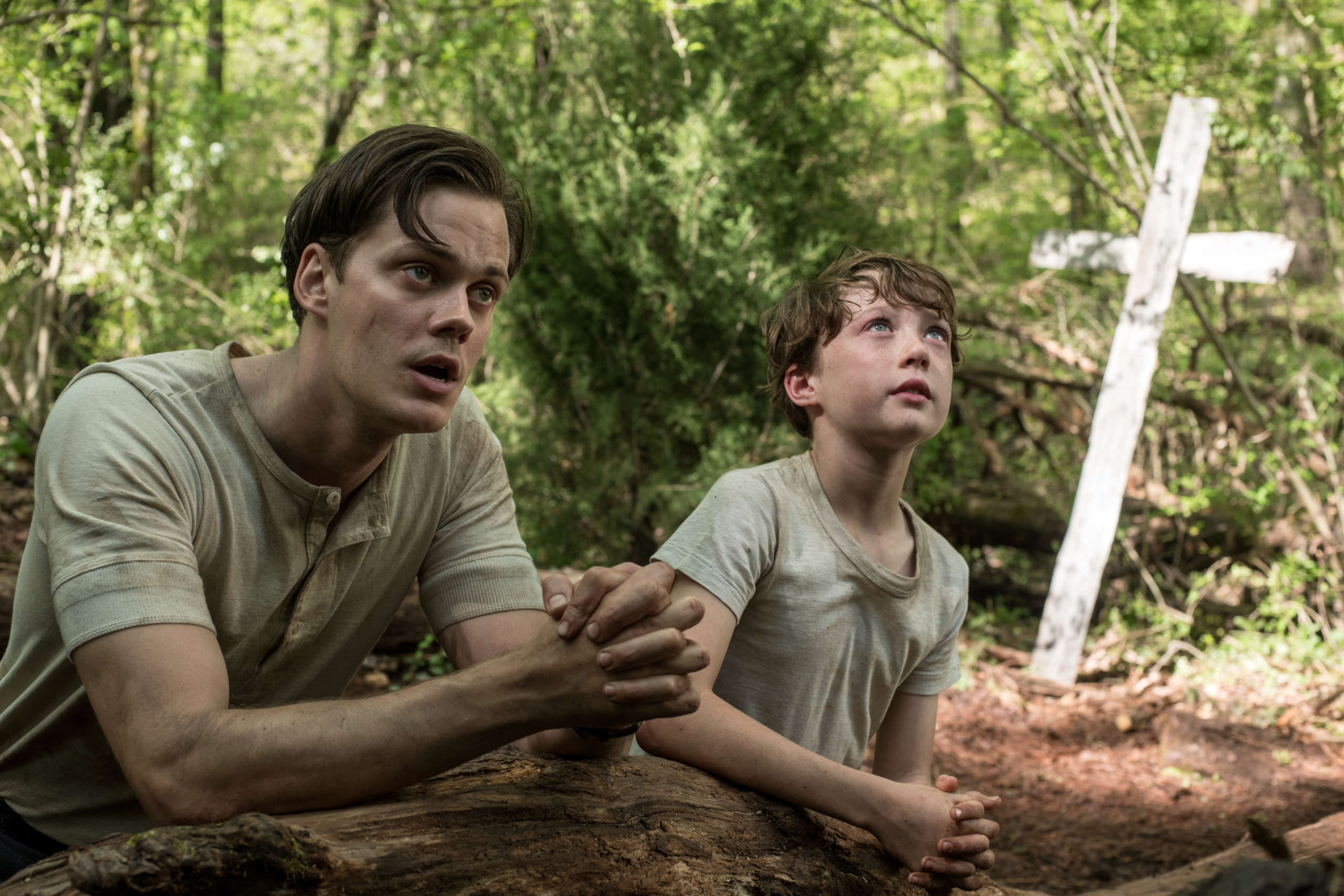
A religious film doesn’t need the supernatural in order to work. In fact, a great deal of the tension in THE DEVIL ALL THE TIME (2020) comes precisely from the lack of supernaturalism, even when God is invoked in fervent, frenzied, desperate prayer. Based on the novel by Donald Ray Pollock, THE DEVIL ALL THE TIME maintains a literary quality on screen thanks to Antonio Campos’ striking but unpretentious direction.The choice to employ a narrator (in this case, Donald Ray Pollock himself) could easily come across as overbearing in a less well-directed project, but it works here. Put simply, THE DEVIL ALL THE TIME captures the feeling of a novel in a way that can only be conveyed on film.

The film foregrounds the murky line between faith and delusion. Characters seek to bargain with a transactional God through sacrifice, human and otherwise. Casualties include a young woman named Helen (Mia Wasikowska) with a fanatical husband named Roy (Harry Melling) who, after two weeks of feverish prayer in a dark closet, comes to realize that he must kill her so that God can be made manifest in her resurrection. Needless to say, no resurrection occurs. The absence of God is on display too in the case of a crucified dog, a sacrifice offered by a haunted war veteran named Willard (Bill Skarsgård) in exchange for the life of his cancer-stricken wife, Charlotte (Haley Bennett). The crucifixion of the dog calls back to a scene from war where Willard witnessed the last moments of an American soldier skinned alive, hung on a cross, and left to die. When Charlotte succumbs to her illness, Willard takes his own life as well. A distinctly protestant combination of angst and delusional fervor produces a high body count in THE DEVIL ALL THE TIME.
The divine fails to manifest for the faithful again and again over the course of the film. But, in the case of a serial killer named Carl (Jason Clarke) and his “bait,” Sandy (Riley Keough), “something like God” reveals itself in violence and death. The pair repeatedly lure unsuspecting men to have sex with Sandy on camera. All of the male models end up dead, though not before a brutal castration in at least one case. In these moments, Carl is able to satiate his desire for the divine, at least momentarily. Insofar as he finds God where others merely seek in vain, one might see Carl as a debauched and deranged Elijah, the biblical figure who calls down fire from heaven when the prophets of Baal can produce only an embarrassing silence despite their self-flagellation. And, like Elijah, Carl’s perverse priesthood mocks the silence of God for those who seemingly pray to a delusion.
The film also features a young preacher (Robert Pattinson), who exploits his power as a pastor and the religious belief of a young girl named Lenora (Eliza Scanlen) in an all-too-familiar plot arc where spiritual and sexual abuse converge. Lenora begins to take her own life after realizing that she’s pregnant, then changes her mind. But after a missed step, she hangs herself accidentally. Though the narrator highlights the fact that the lack of suicidal intention in her death made Lenora “alright with her maker,” the cruelty exhibited in the writing here begins to push past the limit of credibility.
The various plots find their unity in the main protagonist of the film, Arvin (Tom Holland), the son of Willard and cousin of Lenora. Arvin is not the praying type. He does not wait for God to solve his problems. The preacher, Lenora’s abuser, dies by his hand, as do Carl, Sandy, and Sheriff Lee, Sandy’s brother (Sebastian Stan), who comes after him in the film’s climactic scene. In the end, Arvin’s gun proves more efficacious than the prayers of his father, the pleas of Lenora’s abuser, the cunning of Carl and Sandy, and the law. And if God fails to hear the prayers of the faithful, then presumably God fails to take account of Arvin’s vigilantism. In fact, Arvin delivers some semblance of justice in the world, justice that would never come, it seems, if it were left to God alone.

It may be tempting to write the film off as nihilistic, on the one hand, or to retort that it is simply realistic on the other. But such arguments miss the point: THE DEVIL ALL THE TIME is a story, and stories are not philosophical positions. Stories are about characters who develop, who put themselves at risk, and who exhibit in their struggle something true. Yet, while the film may not be nihilistic, strictly speaking, the events that it portrays in the lives of its characters are bleak. The repetition of desperation, of prayer without answer, of the exploitation of the faithful, of coldness and cruelty — these all produce a heavy thematic effect.
The movie does not make an argument about God or religion one way or another, but it does highlight the perils of belief: what believers can do in the name of belief, what carnage belief can wreak in the lives of believers, and the ways in which belief can play a role in a believer’s vulnerability to charismatic abusers. At certain points, the script seems to delight in torturing its characters and teasing its audience. The film’s sadism occasionally breaks what might otherwise be a seamless immersion into the story’s world. But despite any flaws, THE DEVIL ALL THE TIME ultimately succeeds, both as an adaptation and as a film in its own right.




